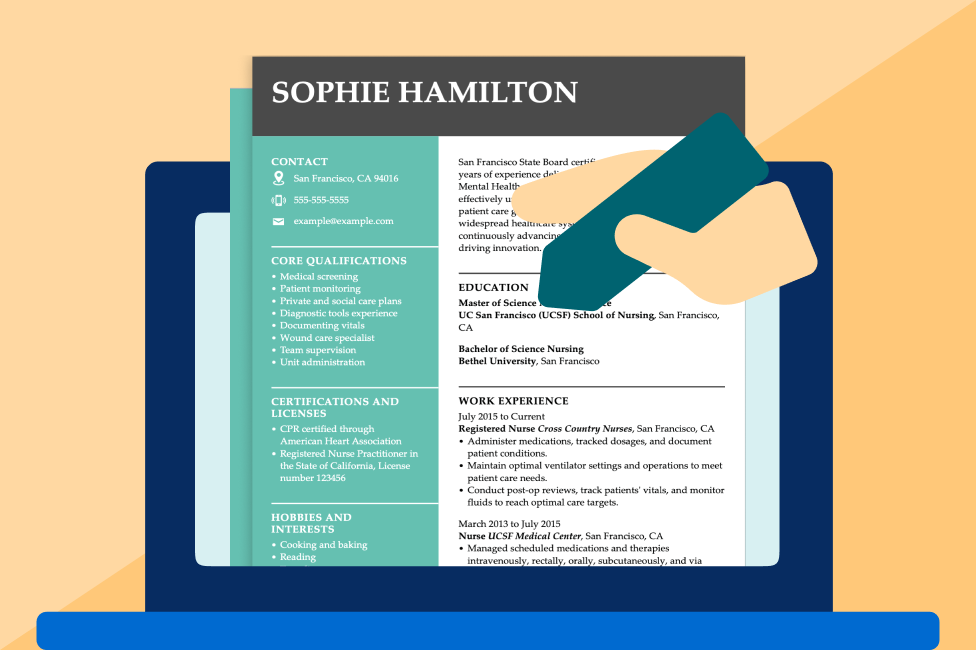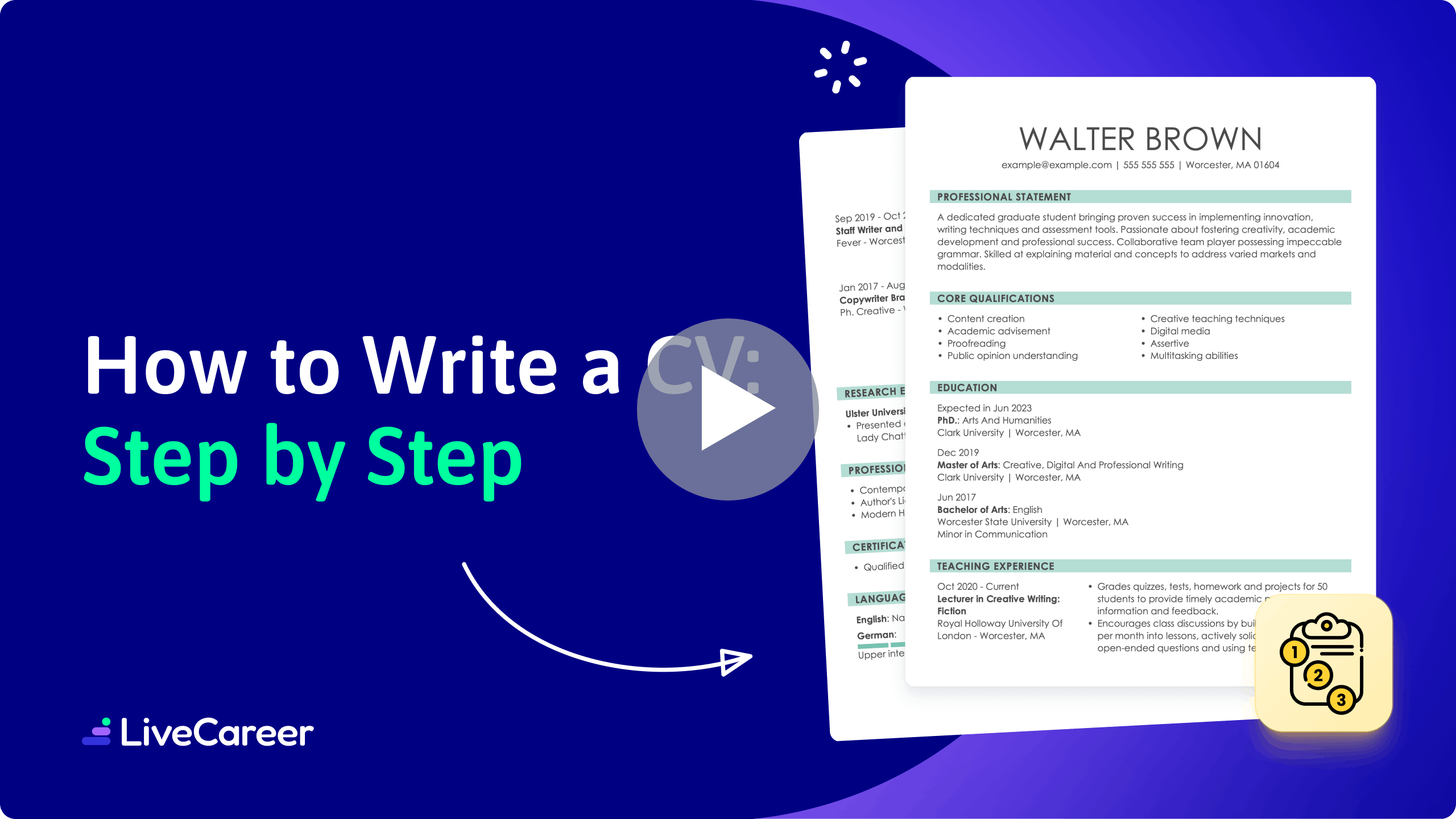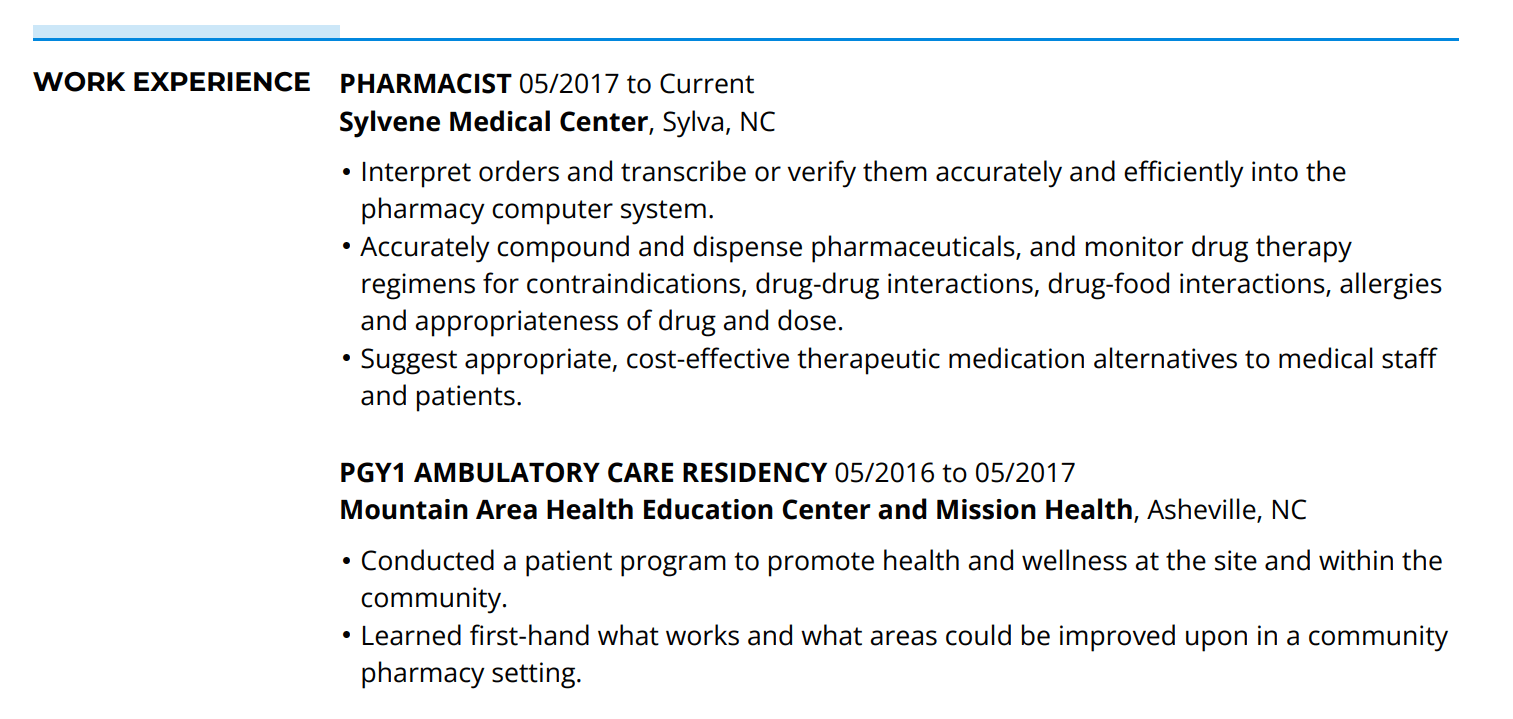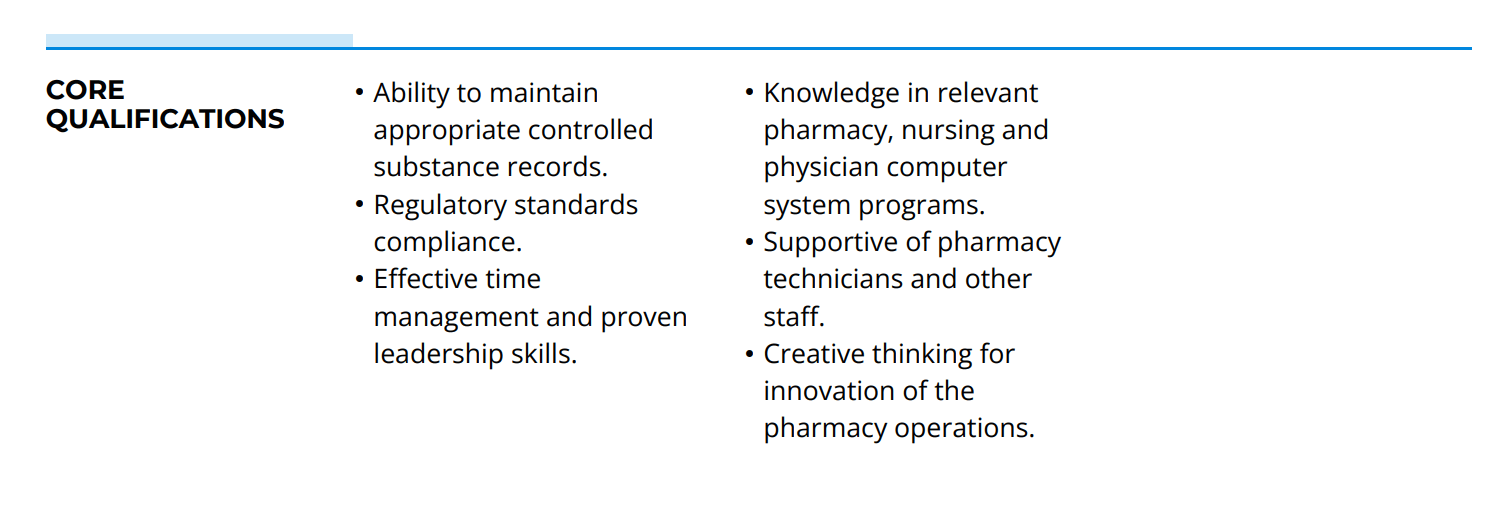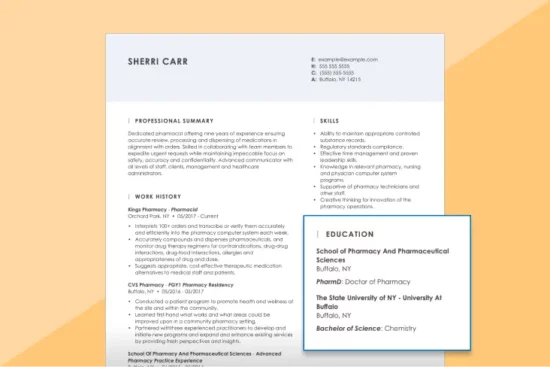How to Write a CV: 6 Proven Steps That Land Jobs
Learn how to write a CV that impresses potential employers and opens the door to your dream role in academia or research.
Hired By:*


Resumes and CVs are two valid options when applying to jobs—but do you know how to write a CV? If you’re curious about how a CV can benefit you as a job seeker, this guide will explain how CVs differ from resumes and provide guided steps on how to write one. Keep reading for experts’ CV-writing tips and editable CV samples.
Play this video for a quick tutorial on how to create a compelling and unique CV using LiveCareer’s CV and Resume Builder.
Want to save time? Our CV Maker is a tool for creating CVs and resumes. It automates the process so that you can have a CV ready in 15 minutes!
What Is a CV?
A CV, or curriculum vitae, is a professional document that outlines your professional or academic accomplishments. While its purpose is similar to that of a resume in the U.S., a CV has a few unique characteristics.
In the U.S., resumes are more common than CVs and are typically shorter. CVs are rarely requested in the U.S. except for jobs in academia, medicine, or science that emphasize education and research. In contrast, CVs are the standard application document for most jobs across Europe, Asia, and Africa.
Here are a few key differences between CVs and resumes:
How to Write a CV
First things first: a CV is a highly customizable document, meaning you have some liberty in the sections you want to include. However, for a job application document to be a proper CV, it should consist of a combination of the following CV sections.
With this CV sample infographic, we’ll teach you how to write the standard five sections and how to pick the best optional sections for your job goals.
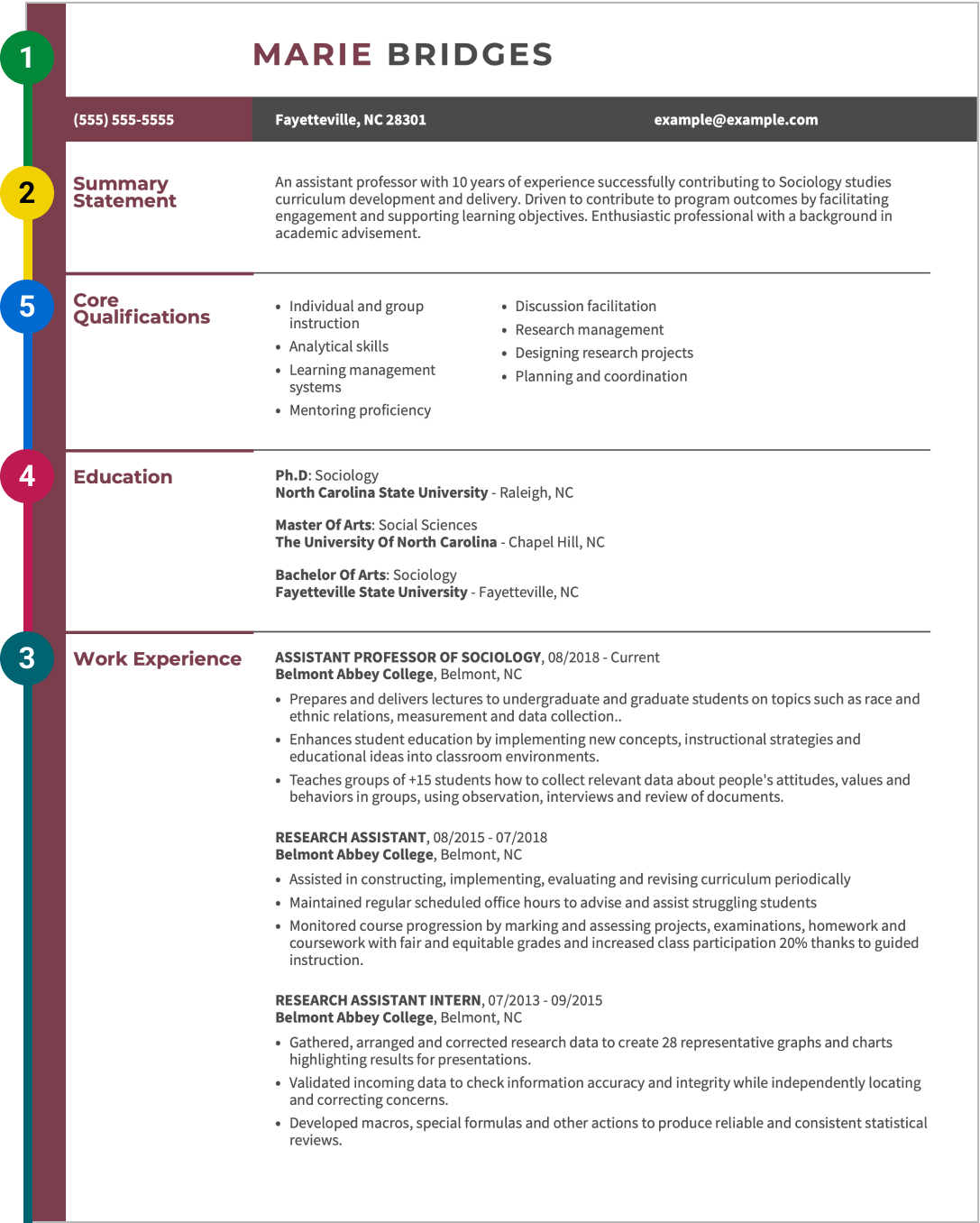
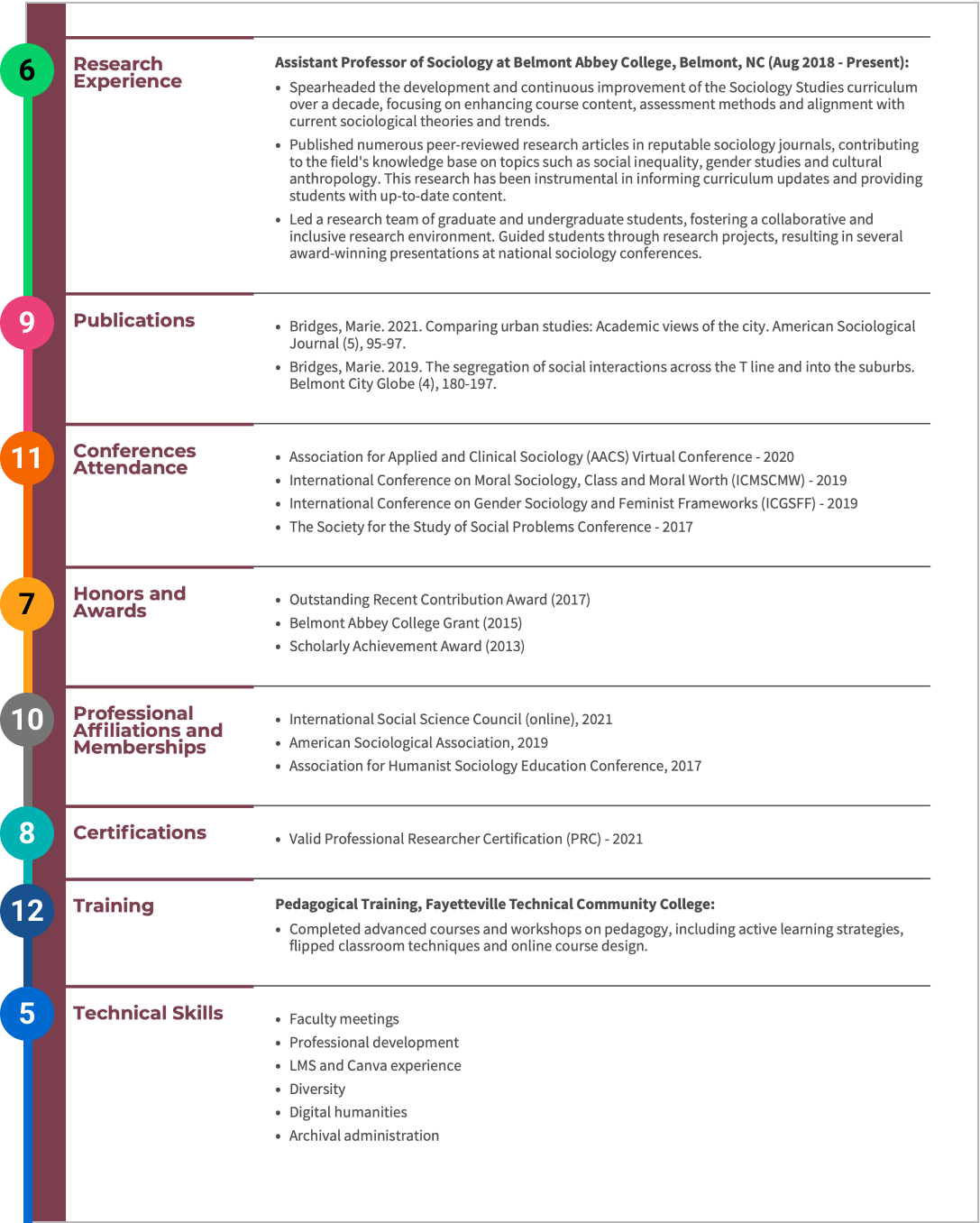
- 1
Contact information/header
- 2
Personal statement
- 3
Work experience
- 4
Education
- 5
Key skills and qualifications
- 6
Research
- 7
Industry awards
- 8
Certifications
- 9
Publications
- 10
Professional affiliations
- 11
Conferences attended
- 12
Additional training
Your CV format doesn’t have to include every single section listed here; for example, if you haven’t published in an academic journal, there’s no need for you to add a publications section.
However, there are five must-have CV sections: the header, summary, work experience, core qualifications/skills, and education. Everything else is optional.
Here’s how to create a CV in six steps:
STEP 1
Add contact information to your CV’s header.
Your CV header consists of your name and contact information.
- Your full name
- Phone number
- A professional-sounding email
- City and state where you reside
- Job title—either your current position or the one you’re applying for
- LinkedIn profile or links to online portfolios and relevant professional social media accounts (optional)
STEP 2
Write a CV summary with a persuasive pitch.
The CV summary statement is like an elevator pitch. Use it to introduce yourself and pitch your top two or three skills to the employer. This pitch can impress the employer and encourage them to read your work history and accomplishments carefully.
To make the most of your CV summary, mention some of the following details in a two to four-sentence paragraph.
- Number of years of experience
- Job-relevant skills
- Academic honors
- Certifications
- Unique achievements that help you stand out
If you have limited experience, use an objective statement to focus on transferable skills, career development and academic goals.
CV objective example
“Sophomore Biology student at Johns Hopkins University interested in applying to AstraZeneca’s Pharmaceutical’s bioinformatics internship. Participated in Harvard University’s Mechanistic Biology and Structural Bioinformatics summer internship program. Experienced in analyzing single-cell proteomics and glycoproteomics using datasets. Proficient in software like Unipept and Integrated Genome Browser.”
PRO TIP
The CV summary is the key section that you should always tailor to the job and company. Feature in-demand skills and relevant achievements—and if you need help, copy, paste, and edit our CV Maker’s ready-made job-specific content.
STEP 3
List your work experience in detail.
Your CV’s work experience section should include all jobs related to the role for which you’re applying.
- Job title
- Employer or company name
- Work location (city and state)
- Dates of employment (month and year)
- Bullet points describing your most relevant achievements within that role
Translator | IU Health University Hospital – Indianapolis, IN
02/2019 – 012/2022
- Translated communications between Tagalog-speaking patients and English-speaking parties as needed.
- Created a backlog of written translations and inserted information into a digital database.
- Collaborated in writing educational booklet of common cultural phrases to assist colleagues during international communications, increasing productivity by 34%.
Quickly create an impactful work experience section with LiveCareer’s CV Maker; it generates hundreds of work experience descriptions you can customize with your skills and quantifiable achievements.
Tips for writing a recruiter-approved CV work experience section
Back your experience with evidence.
Quantify your achievements with numeric data, such as dollar amounts or percentage increases/decreases. This information helps employers calculate your past achievements and skills.
Organize your job titles in reverse-chronological order.
Start with your most recent job and work your way back. A reverse-chronological order helps recruiters gauge your most current skill level and development first.
Incorporate keywords from the job description.
Every job ad gives clues about what employers want from a candidate in the form of resume or CV keywords. Including those keywords (skills, qualifications, tools) that accurately reflect your expertise to show employers you’re the best candidate.
STEP 5
Showcase your educational achievements.
The education section is critical in CVs, and unlike resumes, it goes higher up on the page, ideally after the core qualifications.
A CV education section consists of the following:
- Degree title
- College or university
- School location (city and state)
- Graduation date (optional)
When you have multiple degrees, list them in reverse-chronological order. This way, employers see the most recent and relevant education first.
You should also omit graduation dates, particularly for undergraduate degrees, to avoid hiring bias by employers trying to guess your age. However, you can add an expected graduation or attendance date if you’re completing a degree or transferring to a new academic program.
Ph.D. Biochemistry and Molecular Biology
University of California – San Francisco, CA
Master of Science: Chemistry
Arizona State University – Tempe, AZ
Bachelor of Science: Biology
Arizona State University – Tempe, AZ
STEP 6
Customize your CV with additional relevant sections.
We covered how to write the basic CV sections every document needs, but how do you choose and write additional CV sections? Optional CV sections, like volunteer work, certifications, or languages, help you elaborate on unique skills or experiences relevant to the job.
You can pick and choose these sections based on the job’s needs. For example, a social advocacy position will benefit from volunteering, presentations, and participation in social conferences.
Here’s how to write the most common CV sections:
Research Experience
If you’ve worked on research projects, you can create a section devoted to your experience.
- List research projects, titles, and roles, emphasizing relevance to the job.
- Add research-related achievements, methodologies, and outcomes.
- Tailor details to the role.
Graduate Studies Practicum – University of Honolulu
- Research Assistant: “Code Switching Translation Research Project” (2019). Collected data from interviews, transcribed and indexed them into a project database.
- Course Developer: “Translation and Neurolinguistics.” Assisted course professors in drafting lesson plans and researching lesson materials such as relevant publications, audiovisual media, and research projects from various universities and institutions.
Publications
You should list publications in a separate section if you’ve published more than one article or essay throughout your career.
- List publications in reverse-chronological order.
- Use proper citation style from a relevant stylebook like MLA or AP.
- Add the title, co-authors, publication names, and date or issue number.
- Highlight peer-reviewed articles, books, or significant works related to the job or industry
- Ramirez, José A. and Mueller, Edna M., “Development of Kaposi sarcomas in the maxillofacial region.” Journal of Oncology. 2 Feb. 2018, pp. 10-17.
Teaching Experience
You can add this section if you have teaching experience in addition to your primary job (as a doctor, researcher, lawyer, etc.).
- List teaching roles in reverse-chronological order.
- Share the institution names, dates, courses taught, and responsibilities.
- Prioritize curriculum development, innovative methods, and student success.
- The University of Chicago: Theater Seminar: Race Relations in 20th-century plays.” Chicago, IL
- University of Wisconsin: Contemporary Literature I & II, Madison, WI. 2021-2022.
Affiliations and Memberships
List your affiliations or memberships to any professional organization and mention if you hold any leadership position, such as president or secretary.
- Hispanic National Bar Association – 2017
- California Lawyers Association (CLA) – 2015
Certifications and Licenses
If your role demands it, list certifications or licenses that legitimize your work. Even if you don’t need a license to practice your profession legally, certifications are a great way to prove your continuing education.
- List certifications in reverse-chronological order, including certification name, issuing organization, and date earned.
- Focus on relevant, up-to-date credentials.
- Highlight those required or beneficial for the job to showcase qualifications and expertise.
- Oregon State Public Librarian Certification (2018)
- Library Association of Portland (2019)
Languages
If you speak multiple languages, you should include them in your CV. Being a polyglot can increase your chances of getting hired since you can offer translation services or communicate with a broader range of professionals and clients. Be sure to indicate your level of proficiency.
- English (Fluent)
- Spanish (Fluent)
- French (Conversational)
Conferences
Conference presentations and attendance are part of your professional development. This demonstrates your commitment to continuous learning and industry development, and employers love seeing you as an active member of your professional community.
- DigiMarCon Texas (2021)
- DigiMarCon Las Vegas (2019)
- Savant eCommerce Barcelona (2016)
Grants and Fellowships
Academics, doctors, and researchers get awarded grants and admitted into fellowships because of the value of their work. Committees sometimes choose between hundreds of applicants, so including these is a great way to boost your CV.
- Norman Newell Early Career Grant Program – 2020
- Sepkoski Grant (Paleontological Society International Research Program) – 2019
Awards
Like grants and fellowships, awards and honors demonstrate that peers value your work. Whether your prize is academic or professional, it shows that you excel.
- National Book Award – Best Translation (2019)
- The Athenaeum Literary Award (2017)
How to Nail Your CV Cover Letter
Most jobs that ask for a CV require or encourage you to submit a cover letter.
A cover letter works hand-in-hand with your CV to showcase your personality and writing skills.
Benefits of submitting a cover letter with
your CV
Gain an edge by using our Cover Letter Generator! The builder automates the process of writing a cover letter. All you have to do is follow the prompts and use the ready-made text suggestions specific to the job you’re applying for. Best of all, it also comes with access to the CV Builder to ensure that both of your documents’ designs match.
CV Writing FAQ
What makes a good CV?
Adhering to the job posting requirements is essential, but a good CV goes even deeper and explores the significant details of your entire career.
A good CV should include every element of your work, academic history, and other relevant background information.
How do I write a CV in your builder?
Learn how to write a CV from scratch using LiveCareer’s Builder with this easy three-step process:
- Follow our Builder’s prompts—like answering your desired job title and years of experience—until you complete all the standard sections.
- Once you’ve reached the last step of the process, you’ll find that the builder gives you the option to add custom sections. Every CV is different, so type in the title heading you want to add (e.g., Core Qualifications, Publications, Grants, and Fellowships) and fill in that section.
- You’ll see a document preview after adding all the sections you want. You can click and drag the sections and organize them in the desired order. Then, you’re ready to proofread, download, and send your document to employers!
What are the main things a CV should include?
The main sections your CV should include are:
- Your contact information
- Your professional summary or objective
- Work history
- Top skills
- Education
You can also include other helpful information, such as certifications, publications, honors and awards, or training.
How do I make an ATS-friendly CV?
LiveCareer’s resume and CV templates are tested to pass scans performed by ATS (applicant tracking system) programs.
Our recruiter-approved, CV templates guarantee that your information is well-organized, headers and footers are formatted correctly, the font is easy to read, and margins are clear and adequately sized.
How do I write a CV for an internship?
Even if you lack traditional work experience, you can still include a variety of qualifications for an internship in your CV.
Academic and volunteer work are excellent ways to demonstrate relevant experience. Be sure to strike the right balance of hard and soft skills and use quantifiable metrics!
How do I write an academic CV?
Write your academic CV to respond to the open position’s requirements, focusing on cataloging all academic accomplishments such as publications, research, program assistance, and mentorships.
The more closely you can tie your academic background to the post, the better!
How We Reviewed This Article
Over the past 15 years, we’ve helped more than 10 million job seekers build stronger cover letters, discover their career paths, interview confidently, and boost their chances of finding the right job faster. Review our Editorial Policy to learn more about our process.

